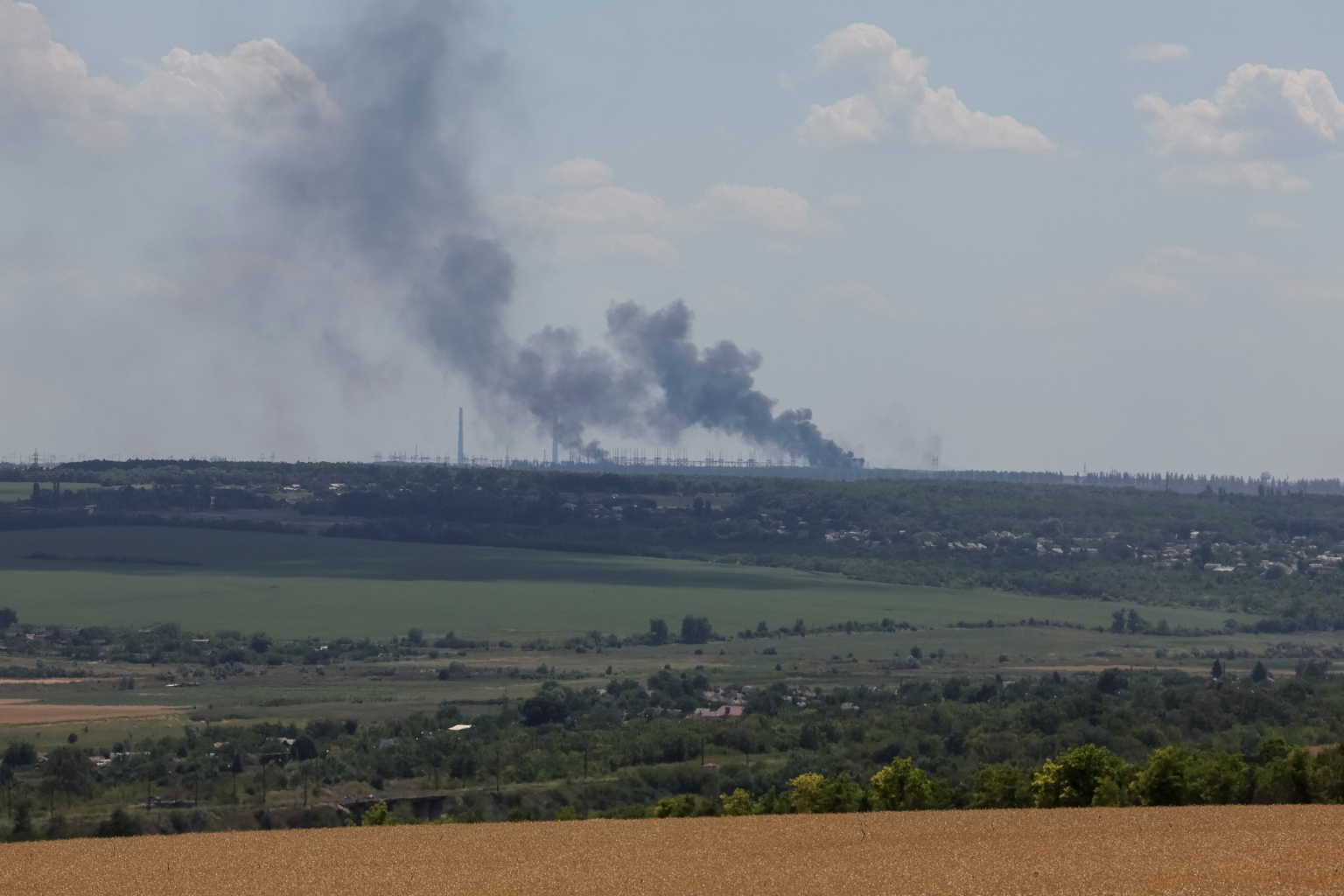Russian-occupied Kherson cut off as Ukraine counter-attacks: Britain
Sign up now: Get ST's newsletters delivered to your inbox

Vuhlehirsk's heat power plant burns in the distance after a shelling on July 13, 2022.
PHOTO: REUTERS
Follow topic:
KYIV (REUTERS) - A Ukrainian counter-offensive has virtually cut off the Russian-occupied southern city of Kherson and left thousands of Russian troops stationed near the Dnipro River “highly vulnerable”, British defence and intelligence officials said on Thursday (July 28).
Ukraine has made clear it intends to recapture Kherson, which fell to Russia in the early days of the invasion launched by Russian President Vladimir Putin on Feb 24.
Britain’s Defence Ministry said Ukrainian forces have probably established a bridgehead south of the Ingulets River, and had used new, long-range artillery to damage at least three of the bridges crossing the Dnipro.
“Russia’s 49th Army, stationed on the west bank of the Dnipro River, now looks highly vulnerable,” it said in a regular intelligence bulletin on Twitter, adding that Kherson was virtually cut off from the other territories occupied by Russia.
“Its loss would severely undermine Russia’s attempts to paint the occupation as a success.”
Oleksiy Danilov, secretary of Ukraine’s National Security and Defence Council, earlier tweeted that Russia was concentrating “the maximum number of troops” in the direction of the Kherson but gave no details.
Oleksiy Arestovych, an adviser to Ukrainian President Volodymyr Zelensky, said Russia was conducting a “massive redeployment” of forces from the east to the south in what amounted to a strategic shift from attack to defence.
Zelensky said Ukraine would rebuild the Antonivskyi bridge over the Dnipro and other crossings in the region.
“We are doing everything to ensure that the occupying forces do not have any logistical opportunities in our country,” he said in a Wednesday evening address.
Russian officials had earlier said they would turn instead to pontoon bridges and ferries to get forces across the river.
Russian-backed forces on Wednesday said they had captured the Soviet-era coal-fired Vuhlehirsk power plant, Ukraine’s second-largest, in what was Moscow’s first significant gain in more than three weeks.
Russia invaded Ukraine on Feb 24 in what Moscow calls a“special military operation” to demilitarise and “denazify” its neighbour. Ukraine and its allies call the invasion an unprovoked war of aggression.
US Secretary of State Antony Blinken said he planned a phone conversation with Russian Foreign Minister Sergei Lavrov - the first between the two diplomats since before the start of the war.
The call in the coming days would not be “a negotiation about Ukraine,” Blinken said at a news conference, restating Washington’s position that any talks on ending the war must be between Kyiv and Moscow.
Russia has received no formal request from Washington about a phone call between Blinken and Lavrov, TASS news agency reported.
US Secretary of State Antony Blinken said he planned a phone conversation with Russian Foreign Minister Sergei Lavrov - the first between the two diplomats since before the start of the war.
The call in the coming days would not be “a negotiation about Ukraine,” Blinken said at a news conference, restating Washington’s position that any talks on ending the war must be between Kyiv and Moscow.
Russia has received no formal request from Washington about a phone call between Blinken and Lavrov, TASS news agency reported.
The United States has made “a substantial offer” to Russia for it to release US. citizens WNBA star Brittney Griner and former US Marine Paul Whelan, Blinken said, without giving details of what the United States was offering in return.
Blinken said he would press Lavrov to respond to the offer.
A source familiar with the situation confirmed a CNN report that Washington was willing to exchange Russian arms trafficker Viktor Bout, who is serving a 25 year-prison sentence in the United States, as part of a deal.
Blinken said he would press Lavrov to respond to the offer.
A source familiar with the situation confirmed a CNN report that Washington was willing to exchange Russian arms trafficker Viktor Bout, who is serving a 25 year-prison sentence in the United States, as part of a deal.
Aside from discussing Americans detained by Russia, Blinken said he would raise with Lavrov the tentative deal on grain exports reached last week between Russia, the United States, Turkey and Ukraine.
Russia reduced gas flows to Europe on Wednesday in an energy stand-off with the European Union. It has blocked grain exports from Ukraine since invading, but on Friday agreed to allow deliveries through the Black Sea to Turkey’s Bosphorus Strait and on to global markets.
The deal was almost immediately thrown into doubt when Russia fired cruise missiles at Odesa, Ukraine’s largest port, on Saturday, just 12 hours after the deal was signed.
Before the invasion and subsequent sanctions, Russia and Ukraine accounted for nearly a third of global wheat exports.
Russia reduced gas flows to Europe on Wednesday in an energy stand-off with the European Union. It has blocked grain exports from Ukraine since invading, but on Friday agreed to allow deliveries through the Black Sea to Turkey’s Bosphorus Strait and on to global markets.
The deal was almost immediately thrown into doubt when Russia fired cruise missiles at Odesa, Ukraine’s largest port, on Saturday, just 12 hours after the deal was signed.
Before the invasion and subsequent sanctions, Russia and Ukraine accounted for nearly a third of global wheat exports.

